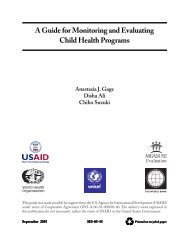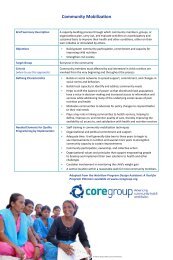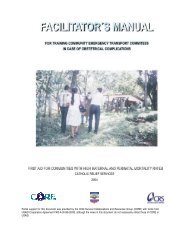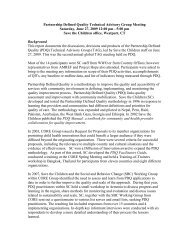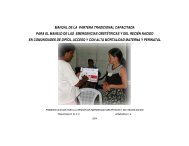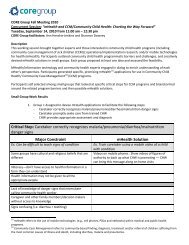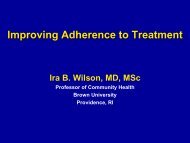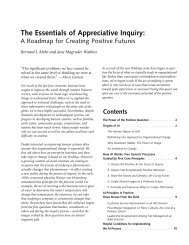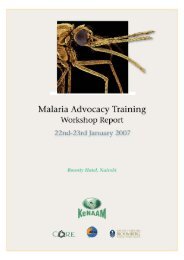Community-Based TB Care: Experience from ... - CORE Group
Community-Based TB Care: Experience from ... - CORE Group
Community-Based TB Care: Experience from ... - CORE Group
You also want an ePaper? Increase the reach of your titles
YUMPU automatically turns print PDFs into web optimized ePapers that Google loves.
<strong>Community</strong> <strong>Based</strong> <strong>TB</strong> care through former <strong>TB</strong> patients’ social clubsorganize the funds of which some poor patients can be provided with food for bettertreatment results through referral and linkage systems.• Collaboration between health workers and former <strong>TB</strong> patients in <strong>TB</strong> controlAll the activities concerning <strong>TB</strong> control implemented by MUKIKUTE have been plannedbefore in collaboration with the Council through <strong>TB</strong> control programme. The health workersincluding the programme coordinators should be present especially during sensitizationmeetings and trainings, to ensure the correctness of the messages provided by former <strong>TB</strong>patients as well as responding to the technical issues rise. In trainings, the coordinators aremostly used as the TOTs in all issues of <strong>TB</strong> control at district and community levels.Health workers accompany with former <strong>TB</strong> patients of the respective area in defaultertracing. This collaboration provides the testimony that <strong>TB</strong> is a curable disease as long as thewhole course of treatment has taken as instructed. This has also providing the opportunity ofeducating the whole family and other <strong>TB</strong> contacts, showing them that they are alsoresponsible in <strong>TB</strong> control.Health education and talks at the centres have been successfully conducted by former <strong>TB</strong>patients with the guidance of health workers. The sessions have to be short like 30 minutesto avoid boring the patients. The topics have to be well pre-planned.The sharing out of former <strong>TB</strong> patients for home based DOT patients’ support is usually baseon the residential areas of the patient and the supporter for easy supervision. One former<strong>TB</strong> patients is allocated to not more than three patients.3.2 Recommendation• All districts are recommended to establishment former <strong>TB</strong> patients’ clubs to be involved incommunity based <strong>TB</strong> care, basing on the MUKIKUTE experience. The major activities forthe clubs are recommended to include conducting sensitization gatherings and trainings;defaulter and <strong>TB</strong> contact tracing; and supervising patients under home based DOT.• Only committed former <strong>TB</strong> patients have to be enrolled to the club. This is recommendedbasing on the fact that, most of the time especially in initial stages, they will be volunteersand they will be needed to contribute for the club as well. This could be successful only ifformer <strong>TB</strong> patients are well informed and trained on <strong>TB</strong> control activities without promisingfor any incentives.• Club registration is recommended for easy management, functioning and for acceptabilityby the partners and the community at large.• Former <strong>TB</strong> patients have to be involved in community <strong>TB</strong> care activities at community,district and regional levels. It is better for the CBTC activities to be planned togetherbetween the Councils and <strong>TB</strong> clubs. Health workers are recommended to provide technical<strong>Experience</strong> <strong>from</strong> Temeke Page 15





